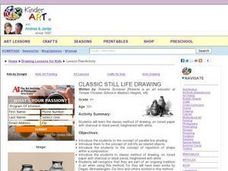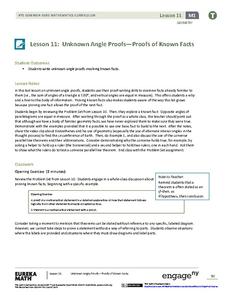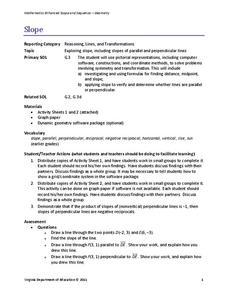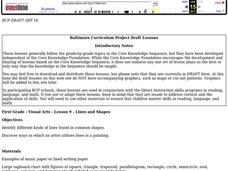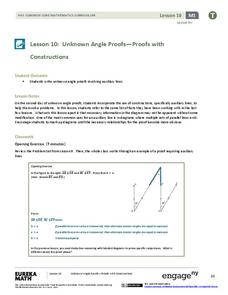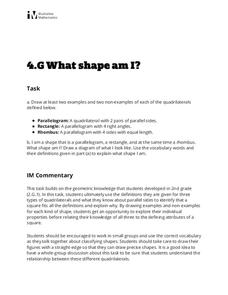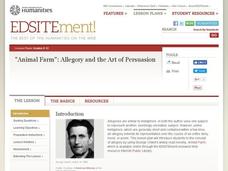EngageNY
Characteristics of Parallel Lines
Systems of parallel lines have no solution. Pupils work examples to discover that lines with the same slope and different y-intercepts are parallel. The 27th segment of 33 uses this discovery to develop a proof, and the class determines...
Curated OER
Classic Still Life Drawing
Provide your young artists with an opportunity to study the masters and their techniques to become skilled at drawing still life. They discuss and view images from artists like Degas and Michelangelo, practice drawing techniques such as...
Illustrative Mathematics
Lines of Symmetry for Quadrilaterals
Explore how lines of symmetry help define different categories of quadrilaterals. Looking at a square, rectangle, trapezoid, and parallelogram, young mathematicians discover that each shape has its own, unique symmetry. Encourage your...
Curated OER
Ruler and Compass Constructions
Fourth and fifth graders examine how to construct perpendicular lines and to bisect angles using rulers and compasses in this unit of lessons. They design a number of polygons using these methods.
Illustrative Mathematics
Proportional Relationships, Lines, and Linear Equations
The resource is a good introduction to what makes a proportional relationship between two lines. Discuss the similarities of both lines and the possibility of intersection. Use this opportunity to list other acceptable forms of each...
EngageNY
Unknown Angle Proofs—Proofs of Known Facts
Lead the class in a Greek history lesson with a geometric twist. Pupils relate a short video about geometric properties to modern-day methods of solving for unknown angles. They discuss parallel line theorems and complete...
National Gallery of Canada
Mastering One-Point Perspective
Cover one-point perspective through observation and practice. Class members examine several works of art that use one-point perspective, look at magazine images to find the vanishing points and horizon lines, and draw their own city...
EngageNY
Nature of Solutions of a System of Linear Equations
If at first you cannot graph, substitute. The lesson introduces the substitution method as a way to solve linear systems if the point of intersection is hard to determine from a graph. The 28th installment of a 33-part series finishes...
02 x 02 Worksheets
Slope
What does slope have to do with lines? Pupils work with lines and determine the slope of the lines informally and with the slope formula. Groups use their knowledge to calculate the slopes of parallel and perpendicular lines. They also...
EngageNY
Fundamental Theorem of Similarity (FTS)
How do dilated line segments relate? Lead the class in an activity to determine the relationship between line segments and their dilated images. In the fourth section in a unit of 16, pupils discover the dilated line...
EngageNY
Construct a Perpendicular Bisector
How hard can it be to split something in half? Learners investigate how previously learned concepts from angle bisectors can be used to develop ways to construct perpendicular bisectors. The resource also covers constructing a...
EngageNY
Informal Proofs of Properties of Dilations
Challenge the class to prove that the dilation properties always hold. The lesson develops an informal proof of the properties of dilations through a discussion. Two of the proofs are verified with each class member performing the...
Texas Education Agency (TEA)
Architectural Rendering
Explore different methods of architectural rendering and technical drawing. Pupils learn about cross hatching, parallel line rendering, random line rendering, rubbing, shading, and stippling in the second instructional activity of the...
BrainPOP
Latitude and Longitude Differentiated Lesson Plan
Scholars warm-up their map skills with a discussion using location words to describe familiar places. An engaging video informs class members about latitude and longitude. Three leveled activities extend the learning experience for...
Illustrative Mathematics
What is a Trapezoid? (Part 1)
Challenge your class to construct a definition for trapezoids. Looking at four examples and four non-examples, students individually create definitions and use them to classify an unknown shape. Allow for small group and whole-class...
Curated OER
Lines and Shapes
First graders identify different kinds of lines found in common shapes. They discover ways in which an artist utilizes lines in a painting.
EngageNY
Unknown Angle Proofs—Proofs with Constructions
Provide your emerging mathematicians with the tools to learn as they incorporate auxiliary lines to solve unknown angle proofs in this continuing segment. They decipher information from a diagram to uncover the missing pieces and...
Illustrative Mathematics
What Shape Am I?
Sharpen your pencil and grab a ruler, it's time to draw some quadrilaterals! Given the definition of a parallelogram, rectangle, and rhombus, learners draw examples and nonexamples of each figure. The three definitions are...
Curated OER
Of Mice and Men
Eighth graders successfully create a newspaper that reflects the Great Depression Era using texts and clues from the literary work Of Mice and Men by John Steinbeck and Something Permanent by Cynthia Rylant and Walker Evans.
San Francisco Symphony
By the Great Horn Spoon!
By The Great Horn Spoon is a fantastic novel for introducing learners to life during the California Gold Rush. First, kids research and analyze American folk songs, then they connect to the text as they listen to symphonic pieces written...
National Endowment for the Humanities
Animal Farm: Allegory and the Art of Persuasion
Introduce your class members to allegory and propaganda with a series of activities designed to accompany a study of George Orwell's Animal Farm. Readers examine the text as an allegory, consider the parallels to collective farms...
National Endowment for the Humanities
Lu Shih — The Couplets of T’ang
Writing poetry in ancient China was the modern equivalent of sending a greeting card. Scholars learn about the ancient Chinese poetic form called the lu shih. They read about the context of poetry during the T'ang Dynasty and complete a...
Curated OER
Earth Matters
Students identify Earth's equator, prime meridian, lines of latitude, lines of longitude, parallels, and meridians.
Curated OER
Conspiracy after the Storm: Editing Dual Murder Plots in Shakespeare's 'The Tempest'
Students edit scenes from Shakespeare's The Tempest in documentary fashion and perform their edited scripts. In this play analysis lesson plan, students read through Act 2 and 3 and discuss how and why to cut lines in a play. Students...
Other popular searches
- Parallel Lines and Angles
- Slope of Parallel Lines
- Geometry Parallel Lines
- Parallel Lines Transversals
- Properties of Parallel Lines
- Introducing Parallel Lines
- Proving Parallel Lines
- Parallel Lines Lesson Plans
- Parallel Lines and Transversal
- Systems and Parallel Lines
- Parallel Lines, Transversal

